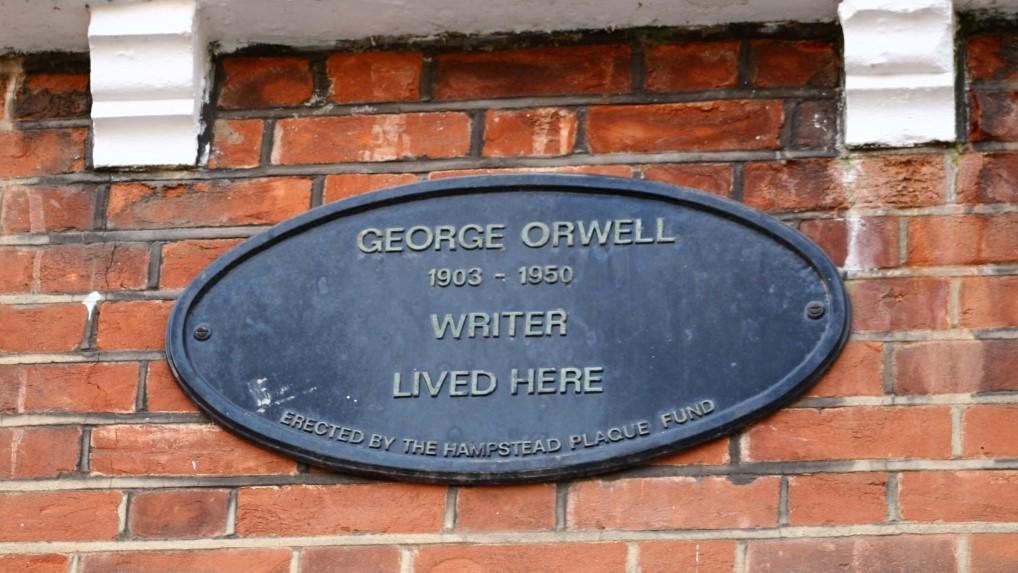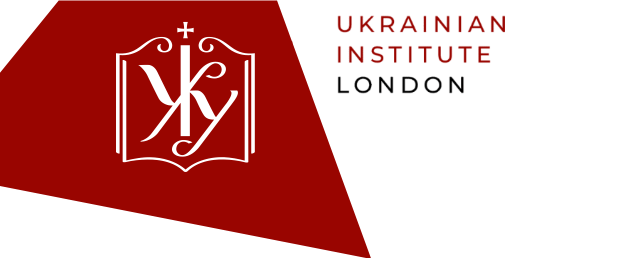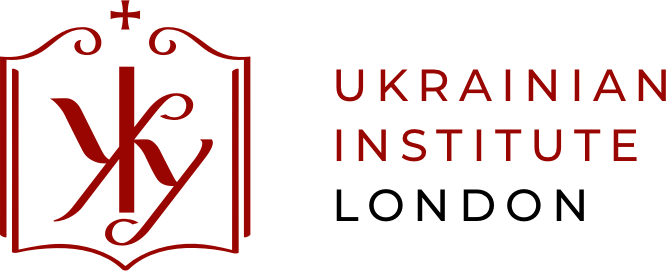At a talk held at the Ukrainian Institute London on 19 July 2012, Andrea Chalupa explained how Orwell’s allegorical novel was translated into Ukrainian and distributed to refugees in displaced persons’ camps.

AUTHOR
Halyna Tatara for Ukrainian Institute London.
The year 2012 marks the 65th anniversary of the publication of George Orwell’s most famous allegorical novel Animal Farm by Ukrainian refugees living in displaced persons’ (DPs’) camps in post-war Europe. Out of the estimated 5,000 copies printed, only around 2,000 survived; the rest were confiscated and destroyed as propaganda by U.S. and Soviet authorities. During 1946-1947, the Ukrainian version of Animal Farm (Kolhosp Tvaryn) was distributed among DPs’ camps by 24-year old patriotic linguistic scholar Ihor Shevchenko, making Orwell very proud of his masterpiece.
To commemorate this unique event, Andrea Chalupa, a writer, journalist and producer from New York, whose parents were born in one of the DPs’ camps in Germany, gave a lecture at the Ukrainian Institute London on 19 July 2012. She shared a great history of Ukrainian refugees who survived Soviet persecution and had been living in DPs’ camps for years, where strong nationalistic Ukrainian spirit was born and flourished, penetrated by ideology, identity, intelligence and political and cultural activity.
After spending years working on the manuscript, George Orwell struggled to find a publisher for Animal Farm, as Soviet satire was not welcome at a time when the West needed Stalin to fight Hitler. Finally Orwell managed to publish Animal Farm in 1945 at a small press for £100. Six months later a copy ended up in the hands of Ihor Shevchenko, a Poland-born son of leaders of the nationalist movement against the Bolsheviks, who had shown a love of languages and the classics from an early age. He was living in exile in Munich with his wife and mother-in-law (his father-in-law was the great Ukrainian poet Mykhailo Draj-Kmara). To support his family, Shevchenko made pocket-sized dictionaries of a thousand Ukrainian and English words and distributed them around DPs’ camps in and around Munich.
After the war, Shevchenko started to work at a daily Polish-language newspaper. There, he would regularly read the Tribune, a democratic socialist weekly, and was a fan of George Orwell’s column, “As I Please”, musings on anything Orwell pleased, which included amusing epitaphs, Scottish nationalism, venereal diseases and American fashion magazines. By the time Shevchenko was put in touch with Orwell, he had already begun work on translating Animal Farm into Ukrainian, doing it during his lunch hours and at night.
While Animal Farm had been a message of hope to the Ukrainian displaced persons, Ihor Shevchenko’s letter was a message of hope to Orwell.
In April 1946, Shevchenko wrote to Orwell, now a mourning widower and single parent of an adopted baby, requesting authorisation to publish his Ukrainian translation. He described to Orwell how he had translated the book out loud to a transfixed audience of Ukrainian DPs and they had always been puzzled how the West could be so naïve about the Soviet Union and wondered if anyone “knew the truth.” He concluded: ”Your book has solved that problem […] Refugees reacted to the underlying values of the book, to the tale ‘types,’ to the underlying convictions of the author and so on. Besides, the mood of the book seems to correspond with their own actual state of mind.” While Animal Farm had been a message of hope to the Ukrainian DPs, Shevchenko’s letter was a message of hope to Orwell, who enthusiastically agreed to a Ukrainian translation.
The story of Orwell and the refugees was an incredible triumph of life amidst so much death and destruction. Between Stalin’s terror famine and the Gulag, Hitler’s concentration camps and the clash of Soviet and Nazi armies during World War II, it was as though hell had opened up across Eastern Europe. What made matters even more oppressive during Orwell’s time was that information was tightly controlled by a few known names at the top. Animal Farm was rejected by four publishers. One of Orwell’s close friends, Inez Holden, had joked: “Imagine old Joe [Jonathan Cape, a publisher], who doesn’t know one word of any European language, sitting in the Kremlin reading Animal Farm and saying ‘I don’t like this.’” Nevertheless, Orwell finally managed to publish his first artistically-driven novel with a small press, who offered him £100 — around £2,500 today.
Two years later, when it came time to publish his translation, Shevchenko experienced a slight complication. The Ukrainian publishing company in Munich “Prometej” was adamant that the book could not be distributed to a Ukrainian audience without a preface. After all the Ukrainian DPs had been through, they needed to know who Orwell was, why they should trust him, and what he wanted. Shevchenko passed along this request to Orwell, writing that the refugees were “often poor people with strained nerves” and “extremely self-conscious and sensitive, especially as far as the contacts with the West or Westerners are concerned.”
In the year Shevchenko produced his translation, he was working during the upheaval and violence of Soviet repatriation. As soon as the war ended, British and American soldiers rounded up Soviet refugees in Germany and Austria. Some of the estimated two million Ukrainian refugees went willingly; they were naïve about what was in store, or desperate to be reunited with family. More commonly, there were mass demonstrations, violent resistance, and sometimes mass suicide.
One shocking scene of resistance took place in August 1945 in Kempton, Germany. Ukrainian refugees were packed into a church, as though summoning divine intervention. The Western soldiers entered the church and started dragging people out by their hair, beating them with rifles. Dozens of DPs on the upper level of the church jumped to their deaths. The British and American forces could not comprehend why these people did not want to return home. As Orwell wrote in his letter to the Ukrainians, in the West, “totalitarianism is completely incomprehensible.” American and British soldiers complained to their seniors about the horrific pandemonium. Word finally reached General Eisenhower, who was appalled that people would rather kill themselves than go back. On September 4th, 1945, Eisenhower stopped forced repatriation in all American operations, and in November the British followed. Repatriation in the Soviet zone continued through 1947.
By then, only 200,000 Ukrainian DPs remained. Around two million had been returned. Stalin considered the refugees traitors for fleeing the country. They were either executed upon arrival or sent to labour camps and stripped of their citizenship. It was in Stalin’s best interest to bring back all the refugees, because they were witnesses to Soviet evil. Their stories would crack the strong façade of the Soviet Union that had created awe and inspiration abroad. As Orwell wrote to a friend, “I have been saying ever since 1945 that the DPs were a godsend opportunity for breaking down the wall between Russia and the West.”
Orwell’s letter to the refugees became the only published introduction to Animal Farm, and the only known personal account of how he developed the book that would be considered his masterpiece.
Shevchenko titled his book Kolhosp Tvaryn — “a Collective Farm of Animals”. He could have done a literal translation, but deliberately chose to put Stalin’s Collective Farm on the cover. Orwell’s letter to the refugees became the only published introduction to Animal Farm, and the only known personal account of how he developed the book that would be considered his masterpiece. However, only 2,000 copies were distributed — a truck from Munich was stopped and searched by American soldiers, and a shipment of an estimated 1,500-5,000 copies was seized as propaganda. The books were quickly handed over to Soviet repatriation authorities and destroyed.
Shevchenko was safe. Around this time, he left Munich and travelled undisturbed to Belgium, wearing a Polish officer uniform. There he was able to get a scholarship at the Université Catholique de Louvain and started on the path to becoming a famous Byzantine and Slavic scholar. Later he co-founded the Harvard Ukrainian Research Institute.
Orwell had been pleased with the quality of Shevchenko’s work. Copies of the Ukrainian edition circulated among a population charged with a revolutionary spirit. There is a notorious cultural and political divide in Ukraine between East and West, but in the refugee camps everyone united against communism. In the 80 overwhelmingly Ukrainian refugee camps of occupied Germany, the Ukrainians established themselves as a free and independent Ukraine by forming organizations that the Allies, under pressure from the Soviets, refused to recognise and tried to outlaw. In the Ukrainian camps, politics was literally survival. Forced repatriation had stopped, but commissions of Allied soldiers would investigate individuals inside the camp, searching for Eastern Ukrainians who fell well within the borders of the repatriation map, and force them to go back to the Soviet Union. In the camps, they could live in a free Ukraine.
Starting after the war, and the threat of repatriation, the Ukrainian DPs immediately created a school system for their children. Organising the schools helped organise the intellectuals. The people with knowledge and skills to pass on became teachers. The Ukrainian DPs wanted entertainment, so publishing companies quickly sprang up, producing adventure novels, books of poetry and heroic tales from Kyivan Rus. Political and literary organisations produced journals and held conferences, bringing together the best artists and leading thinkers from each camp. A library was opened as well as a public gallery and a theatre with performances of Shakespeare in Ukrainian.
Needless to say conditions were not easy. The barracks were divided into 16 rooms — one family per room. The walls were paper-thin and there was no heating or electricity. Money was scarce, and bartering was the primary economy. Clothes in care packages had to be bartered for sizes that fit and food was also in short supply. There were of course violence, a criminal black market economy, corrupt cops, and suicides in the camps. Fights would sometimes break out among the men, usually over women. The patrolling police — comprised of refugees — would sometimes demand money and other things from people.
Ukrainian DPs claimed their political independence as a matter of survival. That political conviction ignited a cultural revolution.
Despite this, the flourishing DP society lasted for around a decade. What made them unique was that, after having lived with Stalin’s persecution and mass murder for over a decade, the Ukrainian DPs claimed their political independence as a matter of survival. That political conviction ignited a cultural revolution. It was at the start of this cultural renaissance that Orwell’s book appeared. Animal Farm was one of many books that circulated in the Ukrainian DP camps — others included The Jungle Book, Don Quixote, Spartacus and novels by Dickens. Interestingly, Animal Farm was the first book Orwell wrote consciously as a work of art, with, as he phrased it, prose as “clear as a windowpane.” He achieved his artistic masterpiece because it was political, as he admitted in his 1946 essay Why I Write: “Looking back through my work, I see that it is invariably where I lacked a political purpose that I wrote lifeless books and was betrayed into purple passages, sentences without meaning, decorative adjectives and humbug generally.” Ukrainians were willing to die for their ideology, and Orwell became an iconic writer because of his ideology. For the Ukrainian refugees and Orwell, political conviction was survival.
In 1946, Animal Farm was published in the United States and made it into the Book-of-the-Month Club. The Ukrainian DPs emigrated to the corners of the world that welcomed them: the United States, Canada, Australia, and South America. And when they left the camps, they took with them their books, community bonds, and social organisations that are still active today like the Ukrainian Youth Association (CYM) and Plast. Out of all the displaced persons of postwar Europe, the Ukrainians were the only ones who arrived in the New World “pre-organised.”


